Making participation available to as many people as possible - The open source platform adhocracy+.

The outbreak of COVID-19 has once again shown that digitization offers great societal opportunities and that tools for online participation are helpful as a supplement to the already established forms of citizen participation and codecision in municipalities and organizations. Participation dialog formats designed for face-to-face presence, such as round tables, office hours for citizens, neighborhood walks, workshops and other events, cannot currently take place as usual, and so digital formats of participation must be considered with a new urgency. The advantages are obvious, and not just in times of Corona: the transparency and visibility of processes is increased, and citizens or members of organizations can have a say regardless of time and place, freely deciding how much they want to be involved. People are increasingly demanding more opportunities to participate in different areas of society, both in their political environment (GESIS 2014) and in their work environment (bipar 2019). To respond to this trend, more and more municipalities are using online platforms for citizen participation. Organizations are also increasingly discovering the added value of engaging their members online.
At the same time, online participation poses major challenges for many municipalities and organizations: Technical know-how is often lacking, human and financial resources are scarce, and the services offered are sometimes confusing and cost-intensive.
At the individual level, the challenges lie in technical hurdles or language barriers, for example. Not all social groups can be reached equally well via online participation. In addition, participation must be established as a process over time, since a positive culture of participation often has to be learned first.
Societal challenges
It is well known from participation research that active participation at the individual level depends not only on attitudes, motives for commitment, e.g., to organizations or certain values, and incentives that promote participation, but also primarily on resources that promote participation, such as education, income, profession, time, and also gender and age (cf. Hallermann 2003:13; Kuhn 2006: 34-35). Social dimensions of inequality are reproduced in participation. The better a person is socially situated and integrated, the more likely he or they are to participate in social decision-making processes.
Another influence on the accessibility of participation processes is the complexity of the procedures. The more complex participation formats are, the more unequal they also become in the composition of their participants (cf.: Schäfer/Schoen 2013: 99). In comparatively simple forms of participation, such as elections, the individual inequality in participation is not as great as, for example, in participation in political parties. These individual inequalities are also reflected, among other things, in the nomination of candidates for political office, representation in parliaments and the responsiveness of political decisions (cf.: Elsesser/Hense/Schäfer 2016). Another difficulty lies in the unequal financial resources available to municipalities in Germany. Current figures show how great the differences are between individual municipalities and how regional inequalities manifest themselves over time (Kommunaler Finanzreport 2019).
Community involvement must not be allowed to fail because of the budget. Tight budgets in the municipalities of certain regions or low funding of non-profit organizations must not be the cause for a renunciation of participation and inclusion.
Against this background, Liquid Democracy e.V. pursues the goal of making participation easier and more accessible for as many people as possible and, to this end, develops free tools for online participation in various areas of society such as municipalities, organizations, institutions or companies.
To improve individual participation opportunities, the platform is easy to access. Registration with an email address and a freely selectable user name (pseudonym) "data minimization". In addition, the operation of the platform is designed barrier-free and meets ergonomic standards for usability. The platform is responsive and thus easy to use on different screen sizes. The barriers to participation should thus be as low as possible.
A strong civil society needs instruments of involvement and dialogue-oriented formats of citizen participation. With this claim, adhocracy+ mainly addresses municipalities and organizations that lack the resources for paid participation tools but still have the need to use or try out online participation.
Since adhocracy+ is an open source platform, the development of the software is also open to ideas and contributions from others and can be further developed together with interested parties. All further developments benefit all users equally.
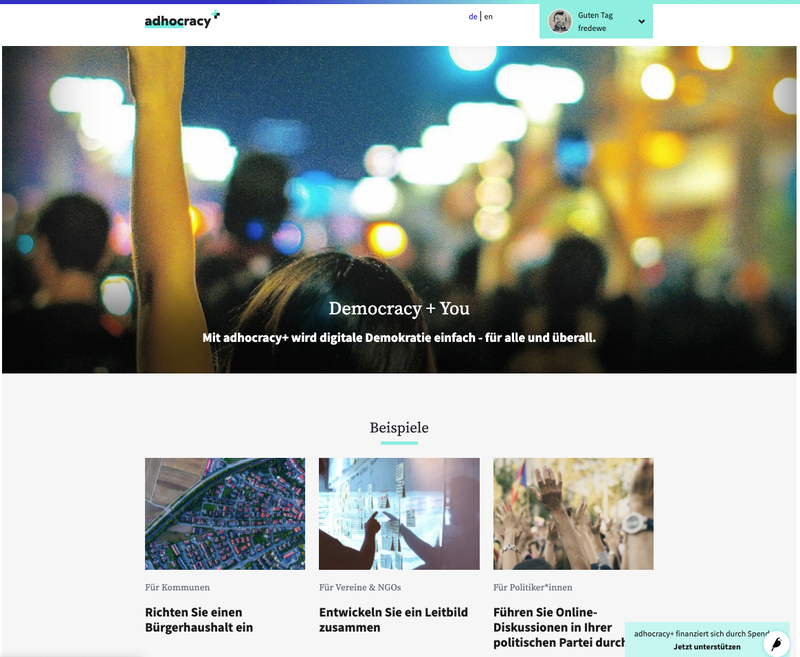
Figure 1: On the homepage of adhocracy+ you can find many examples of use, e.g. for municipalities, associations, companies or politicians.
Flexible and transparent participation processes
adhocracy+ offers various functions to realize participation projects with different content and methodological focuses. Organizations on adhocracy+ can individualize their area with their own background image, logo, slogan, information and texts about the background of their participation processes and thus create a visual recognition effect to their organization. Here are some examples of important functions at a glance:
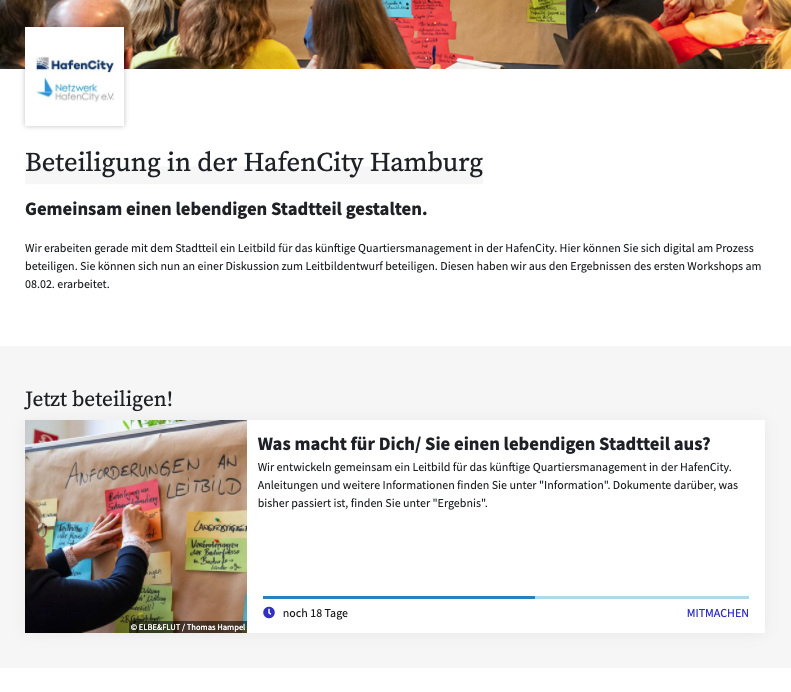
Figure 2: Example of a HafenCity Hamburg start page on adhocracy+ with background image, logo and call for participation.
10 modules can be freely combined
The development of the platform also focuses on the versatility of participation processes and the combination of online participation with face-to-face events. Therefore, there are ten different participation modules on adhocracy+. The modules range from simple brainstorming and idea competitions with and without map function, text comments or surveys to participatory budgets or a debate module for better structured online discussions. The participation modules can be freely combined with each other and can take place simultaneously or consecutively in a project. This allows participation processes to be displayed on a timeline from start to finish, as also shown in the example of a mission statement process for HafenCity Hamburg (Fig.3).
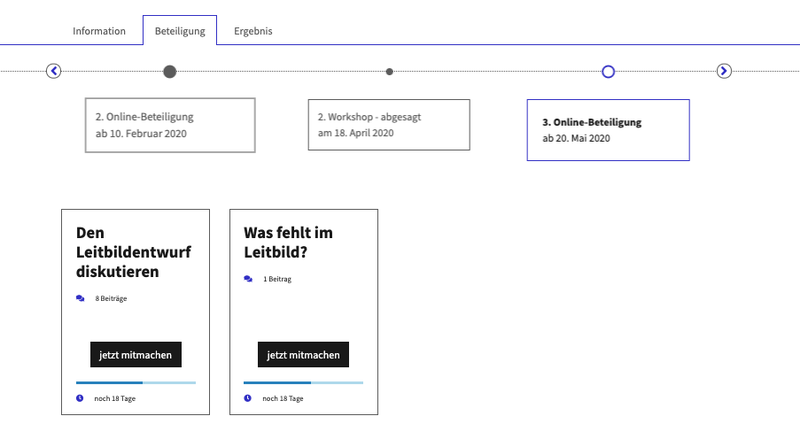
Figure 3: In the case of HafenCity Hamburg's mission statement development, all dates of the participation process (online and offline dates) are displayed on a timeline.
Connecting online and offline
Face-to-face events can also be displayed in the Timeline so that the entire participation process is visible to everyone on the platform. This is so important because it allows the people involved to know at all times which phase the process is in and to better understand how the results of the individual phases work in the overall process. In this way, the complexity of the process is significantly reduced and accessibility is increased. The overall process can additionally be explained in more detail on a background page.
In addition to normal face-to-face events, the "Interactive Event" module can also be integrated into the process. This module provides digital support for moderation at face-to-face events. During an event, questions can be asked live via smartphones in a data-minimizing manner without prior registration, and these questions can be viewed by the moderator and the participants. This removes the barrier of having to say something publicly and opens up a "safe-space" ffor people who don't prefer to speak in front of others. At the same time, the moderator is shown characteristics (e.g. gender, age, education, etc.) of the person asking the question, which can be selected beforehand from options given by the moderator. This is intended to make it easier for the moderator to have a balanced discussion, because he or she can deliberately integrate questions from groups that are underrepresented and not dominant in speech into the discussion. For example, if a panel discussion is predominantly made up of politicians, the moderator can deliberately include the contributions of citizens as well.
Private projects on adhocracy+
Not every participation concerns everyone. Besides the possibility of public participation, adhocracy+ also offers private projects. In these projects, initiators can invite a defined group of users by mail via the platform. Only invited people can then access the participation process. The process is not visible to the public. This is particularly useful if only members or only a specific group of an organization is to be involved.
Moderation
Good participation also requires good moderation. We know from scientific studies that online discourses are of higher quality when they are moderated. In addition, activating moderation increases the incentives to participate. People who can expect a reaction contribute differently. A neutral moderator should observe the discussion and intervene if rules are violated. The moderator also helps with questions and catches discussions that stray from the topic. The platform can be used to invite moderators who are clearly identified as such in the discussion. They can react specifically to contributions from participants and intervene in an emergency. Usually, an activating moderation is sufficient. Breaches of the rules rarely occur in practice.
Introduction to adhocracy+ and implementation
Since November 2019, about 80 different organizations and municipalities have registered for online participation on adhocracy+ and are using the platform for various participation projects. Among the using organizations are municipalities as well as universities, urban planning offices, companies, NGOs, trade unions, parties, initiatives and movements, and politicians from constituencies.
Start with adhocracy+
There are comprehensive instructions for setting up adhocracy+, the user interface is structured in an understandable way and can be used intuitively. Some texts like imprint, background information and descriptions of the processes have to be written and inserted. For better clarity, images can be used for graphical support, as can be seen in the example from CityLab Berlin (Fig.4).
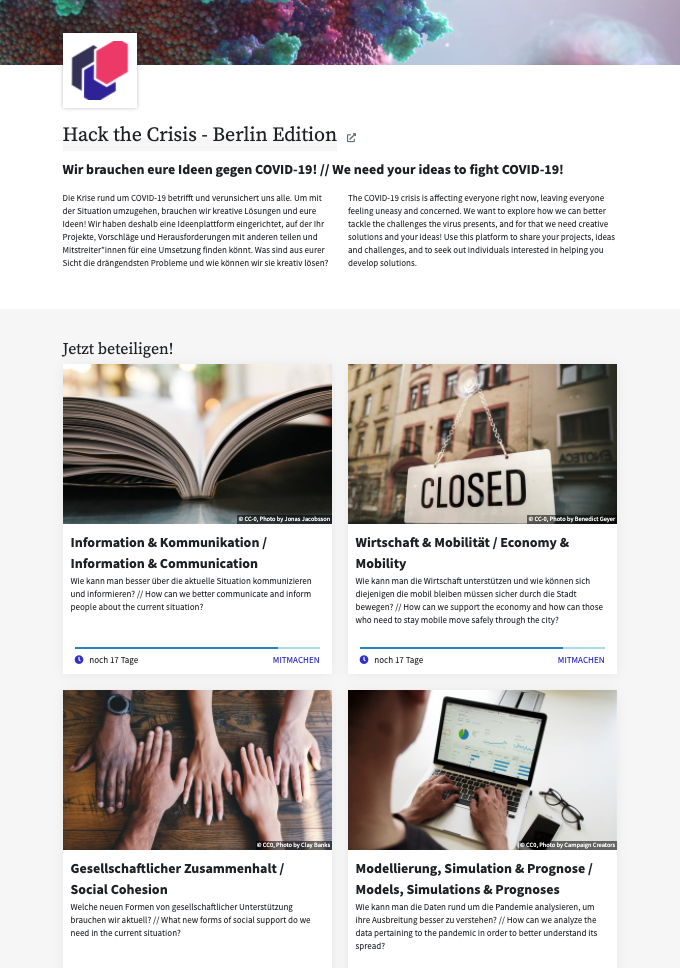
Figure 4: Start page of the Hack the Crisis project of CityLab Berlin: https://adhocracy.plus/citylab-berlin/
adhocracy+ in times of COVID-19
CityLab Berlin uses adhocracy+ for the project Hack the Crisis, which collects creative proposals for solutions to deal with COVID-19. Citizens can contribute ideas and suggestions on the platform and name challenges and exchange ideas with other users. CityLab uses the Idea Challenge module for this purpose. In this module, ideas can be submitted in a first phase and commented on by the participants. When submitting an idea, it can be assigned to a previously defined category, e.g. "challenge", "project design" or "question". This makes it easier to find and evaluate contributions.
In a second phase, the ideas submitted can then be prioritized by all participants. Ideas can be rated for this purpose. At the end of the project period, it is visible which ideas have been particularly well received by the community.
adhocracy+ for citizen participation in communities
adhocracy+ is actively used for citizen participation in municipalities. From April 16 to June 15, 2020, the city of Werder (Havel) used the module "Brainstorming with Map" to collect ideas for improving the pedestrian and bicycle infrastructure. Participants were able to contribute ideas and hints and locate them on a map using the categories "bicycle path", " sidewalk", "parking facilities", "dangerous intersection" or "other". In total, more than 300 suggestions were received during this period, which can now be processed by the administration.
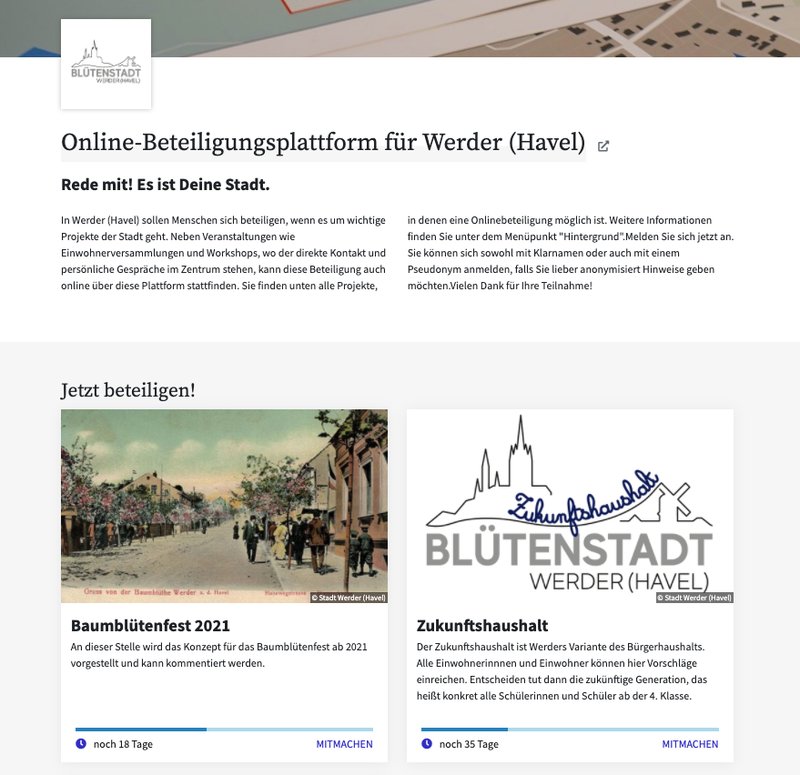
Figure 5: Current participation processes of the city of Werder (Havel) for the Tree Blossom Festival and the Future Budget: https://adhocracy.plus/werder-havel.
Currently, a participation for the Tree Blossom Festival 2021 with the module "text commenting" and a future budget with the module "participatory budget" are taking place in Werder (Havel).
In the case of text commenting, a concept for the Tree Blossom Festival 2021 is up for discussion, in which citizens can comment on a document divided into chapters and sections. In addition, plans and background information are linked and can also be commented on. The city of Werder (Havel) is taking a special approach to the future budget: ideas can be submitted by all citizens, and students starting from the 4th grade can then decide on them. This is intended on the one hand to strengthen the participation of children and young people, and on the other hand to make the priorities of the coming generation visible.
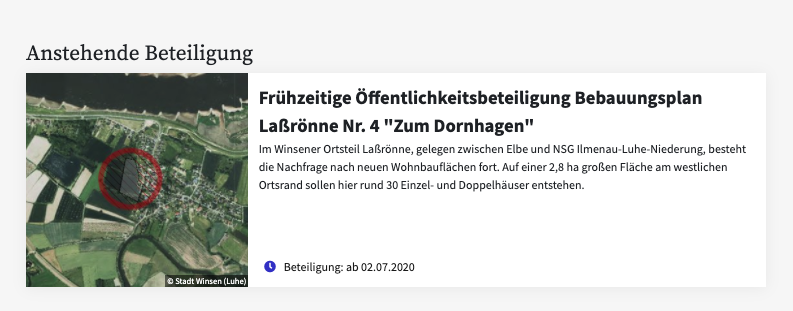
Figure 6: Example of formal public participation in the city of Winsen (Luhe).
adhocracy+ is also used for formal public participation. The city of Winsen (Luhe) uses the Brainstorming module for a planned early public participation on a development plan for 30 single and double houses. The online participation takes place in addition to an information event, which also allows those who cannot attend the event to participate.
Social impact and outlook
At the very least since COVID-19, the time is right for the introduction of digital participation formats. While online participation is only capable of breaking down the socially existing individual inequalities that are reproduced in participation to a limited extent, it can nevertheless address regionally conditioned inequalities and also simplify individual access to participation. adhocracy+ is being developed with the aim of enabling online participation even in places where participation would otherwise not take place for capacity reasons.
adhocracy+ is continuously developed and improved together with the users. Many new features, such as multilingualism or access via an app, will be added in the future.
Currently, free webinars on adhocracy+ are offered.
Literature
§ Bertelsmann Stiftung (2019): Kommunaler Finanzreport 2019. Online abrufbar unter: https://www.bertelsmann-stiftung.de/fileadmin/files/Projekte/Kommunale_Finanzen/Finanzreport-2019-gesamt.pdf
§ bipar, Berlin Institut für Partizipation (2019): Studie zu Erwartungen an neue Formen von Demokratie in der Arbeitswelt, Berlin. Online abrufbar unter: https://www.bipar.de/wp-content/uploads/2019/06/bipsr_studie_dia_2019_lang.pdf.
§ Elsässer, Lea/Hense, Svenja/Schäfer, Armin (2017): »Dem Deutschen Volke«? Die ungleiche Responsivität des Bundestags. In: Zeitschrift für Politikwissenschaft, 27 (2), 161–180.
§ GESIS, Leibniz-Institut für Sozialwissenschaften (2014): Allgemeine Bevölkerungsumfrage der Sozialwissenschaften ALLBUS 2014. Studiennummer 5240. Köln: GESIS Datenarchiv.
§ Hallermann, Andreas (2003): Partizipation in politischen Parteien: Vergleich von fünf Parteien in Thüringen. 1. Aufl. Baden-Baden: Nomos-Verl.-Ges.
§ Kuhn, Frank (2006): Elektronische Partizipation: digitale Möglichkeiten, Erklärungsfaktoren, Instrumente. 1. Aufl. Wiesbaden: VS, Verl. für Sozialwiss.
§ Schäfer, Armin/Schoen, Harald (2013): Mehr Demokratie, aber nur für wenige? Der Zielkonflikt zwischen mehr Beteiligung und politischer Gleichheit. In: Leviathan, 41 (1), 94–120.
Autor
Frederik Wegener studied political science at the Otto Suhr Institute of the Free University of Berlin and is co-founder of Liquid Democracy e.V. He works as a project manager and consultant for online participation and oversees the development of the free open source platform adhocracy+.
Contact
This article by Frederik Wegener appeared in the Netzwerk Bürgerbeteiligung newsletter on July 2, 2020.
Redaktion eNewsletter
Netzwerk Bürgerbeteiligung , c/o Stiftung Mitarbeit
Redaktion eNewsletter
Ellerstraße 67, 53119 Bonn
E-Mail: newsletter@netzwerk-buergerbeteiligung.de